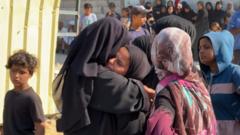Amid ongoing accusations of imposing starvation on Gaza, Israel has initiated humanitarian aid airdrops and temporary military pauses, stirring controversy as international bodies and Hamas denounce these actions as insufficient or deceptive.
Israel's Humanitarian Aid Measures: A Controversial Response to Global Condemnation

Israel's Humanitarian Aid Measures: A Controversial Response to Global Condemnation
In light of international outcry over the humanitarian crisis in Gaza, Israel has introduced new measures intended to improve aid delivery, as criticisms persist regarding its responsibility for starvation.
Israel is facing harsh international backlash over its role in Gaza's humanitarian crisis, prompting it to announce a series of measures designed to enhance aid delivery. The Israel Defence Forces (IDF) stated that these updates, aimed at improving the humanitarian response, include airdrops of aid. The IDF executed its first airdrop last night, followed by an aid flight from the United Arab Emirates scheduled for a later date.
Further attempts at appeasement include a "tactical pause" in military operations across certain areas of Gaza and the establishment of "designated humanitarian corridors" intended to counter claims of systematic starvation. However, Hamas has dismissed these gestures as a "deception," accusing Israel of whitewashing its image amid mounting global scrutiny.
Despite Israel's insistence that it bears no responsibility for the humanitarian calamity occurring in Gaza, this sentiment is increasingly questioned among its traditional allies, including close European nations, as well as various humanitarian organizations like the United Nations. A recent joint statement from Britain, France, and Germany urged Israel to lift humanitarian restrictions and enable UN agencies to resume relief efforts actively. Israel has historically hindered the movement of aid, implementing a blockade and placing limitations on the contents of aid convoys entering Gaza.
In a controversial maneuver, Israel created the Gaza Humanitarian Foundation (GHF), designed to manage aid distribution—an action the UN and various agencies have criticized as militarized and inhumane. GHF's practices have reportedly resulted in serious casualties among civilians seeking food, with over 1,000 Palestinians reportedly shot dead in their attempts to access aid since GHF operations began. A retired U.S. special forces colonel claimed he witnessed IDF soldiers open fire on civilians, further exacerbating tensions.
As the IDF continues its military operations in Gaza, the situation is dire. The head of the UN’s Office for the Coordination of Humanitarian Affairs in the Occupied Palestinian Territories, Jonathan Whittall, described the current conditions as unprecedentedly critical. He emphasized that for any of the newly announced measures to successfully improve the situation, Israel must drastically reduce the processing time for aid trucks and guarantee the safety of those collecting food.
Prime Minister Benjamin Netanyahu and former Defence Minister Yoav Gallant currently face international scrutiny as the International Criminal Court has charged them with war crimes linked to starvation tactics against Palestinians. Both officials refute these accusations.
Though Israel has showcased footage of its airdrops—designated to look more palatable in the public eye—the method of distributing aid from the air has historically come under scrutiny for its inefficiency and inherent dangers. Aid drops are often seen as a sign of desperation and generally yield unfavorable results. Critics argue that for Gaza's most urgent food shortages to be resolved, what is needed is not only a temporary pause in conflict but a long-term, unrestricted supply chain of humanitarian aid. Historically, conflict zones have proven that ground transport remains the most effective means of providing relief to those in dire need, especially in areas as populated as Gaza.



















